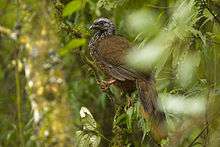Bearded guan
| Bearded guan | |
|---|---|
 | |
| Scientific classification | |
| Kingdom: | Animalia |
| Phylum: | Chordata |
| Class: | Aves |
| Order: | Galliformes |
| Family: | Cracidae |
| Genus: | Penelope |
| Species: | P. barbata |
| Binomial name | |
| Penelope barbata Chapman, 1921 | |
The bearded guan (Penelope barbata) is a species of bird in the Cracidae family, the chachalacas, guans, and curassows. It is found in Ecuador and Peru. Its natural habitat is subtropical or tropical moist montane forests. It is threatened by habitat loss.
Appearance
The bearded guan (Penelope barbata) is a small mostly brown bird that is about 55 cm large, and named for it red dewlap (or beard) While most of the bird is brown, it has dark grayish-brown upper parts and rear underparts an well as a silver crown and neck feathers. The bird also has white feathers edging its neck and breast, red legs, and a rufous tail.
Habitat
The bearded guan (Penelope barbata) lives at an altitude of 1200–3000 m in a humid environment located in northwest Peru and southern Ecuador.
Threats
The greatest threat to the bearded guan (Penelope barbata) is deforestation for agriculture and mining.
Diet
No information is known about the dietary habits of the bearded guan (Penelope barbata) , however guans in general eat various fruits and berries and well as leaves, flowers and insects.
Reproduction
Bearded guan (Penelope barbata) are a monogamous, territorial species that mate at the beginning of the rain season (March–July). Most species of Guan reach sexual maturity at two years and can reproduce until they reach the age of twenty. A pair of guan will produce a clutch of three eggs which the female will incubate for 24–28 days.
References
- ↑ BirdLife International (2012). "Penelope barbata". IUCN Red List of Threatened Species. Version 2013.2. International Union for Conservation of Nature. Retrieved 26 November 2013.
External links
- BirdLife Species Factsheet.
- http://www.birdlife.org/datazone/speciesfactsheet.php?id=73
- http://www.fao.org/docrep/t0750e/t0750e0e.htm
- http://neotropical.birds.cornell.edu/portal/species/overview?p_p_spp=42032
- Bearded Guan videos on the Internet Bird Collection
- Photo & specifics-High Res; Article oiseaux
